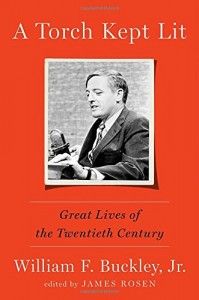Top 10 consetvative books of 2016
My personal favourite ,.,
A Torch Kept Lit by William F. Buckley, Jr, edited by James Rosen 
For the first time ever, William F. Buckley, Jr’sgreatest eulogies have been collected together in one accessible tome, edited by Fox News’ James Rosen. A Torch Kept Lit: Great Lives of the Twentieth Century is, as the title says, a collection of eulogies for the greatest political, cultural and historical figures of the 20th century. A Torch Kept Lit lets readers enjoy Buckley’s signature style and wit while also appreciating the legacies of these great men and women.
Must download that onto my kindle
thanks Brocky

Brocky - I have wracked my brains wondering what to buy my son for his Birthday next month - you have solved the problem. He is a avid reader and I'm sure he'll enjoy this book.
I'm teaching my son how to be a good conservative and capitalist
at 23 he's already saving g for his first investment property
he wants to be financially independent before 30
inspired by Trump no doubt ????
https://www.theguardian.com/books/2017/apr/10/new-age-ayn-rand-conquered-trump-white-house-silicon-valley
Shared via the Google app
Interedting article on Ayn Rand
3 Reasons Steve Jobs was an Objectivist
I’ll start out right away by openly declaring my admiration and high regards for both Ayn Rand and Steve Jobs. Both were great visionaries, that the world needed in order to progress forward.
Whenever I read Ayn Rand’s novel The Fountainhead, I can’t help thinking that the one real life person who’ve most obviously exemplified the main character traits of Howard Roark, is Steve Jobs. No question about it.
Here are the top three reasons why Steve Jobs was an Objectivist:The number one trait that made Steve Jobs a prime objectivist: Steve Jobs did as he wanted to do, regardless of the opinions and beliefs of those around him. Steve Jobs was uncompromising, and only wanted to built the best. The best as in “the best – according to Steve”. It’s adamant, original out-of-the-box thinking like that, which brought us the Mac, the iPhone, the iPad, etc.Steve Jobs was a big believer in proprietary ideas and inventions. According to Steve Wozniak, Steve Jobs’ favourite character from Ayn Rand’s book might have been Hank Rearden, the inventor and producer of the exclusive Rearden Metal special metal alloy.Steve Jobs believed in hard work as the road to success. Watch this short video (only 1:29 minutes) where Steve Jobs explains the rules for success.
So there you have it. Steve Jobs was indeed the real world exemplification of Howard Roark (or Frank Rearden according to Steve himself).
UPDATE : Check out this cool piece of art made by the artist David Datuna, which features a huge portrait of Steve Jobs made up of tiny Ayn Rand portraits. Like a mosaic. However, it’s covered by lenses! Pretty amazing, so I find it almost (!) fathomable as to how it sold for 210.000 (210-thousand!) USD! You can read an article about it here and subsequently watch a short video that shows it in detail.
Do you have any other reasons why Steve Jobs was an objectivist? Let me know below.
Passionately prepared by Oliver Nielsen on Jun 05 2012 ? 4 compliments to the chef
I'm reading Conservatives and universities via the Spectator Australia app https://app.spectator.com.au/2017/04/conservatives-and-universities/pugpig_index.html
Belatedly, the Left’s capture of our universities is attracting some attention. Not enough, of course, but it’s a start after a thirty year silence. Of the many failings of the Liberal National Coalition in and out of government, there is none that is quite as stark as its impotence in the face of the Left’s capture of our universities since the 1980s
Today’s emerging political unease about the Left’s capture of our universities has been a long time coming. Sadly, this has arisen for reasons that are quite marginal to the main issue (concern about ‘safe spaces’, ‘trigger warnings’, free speech on campuses) rather than the intellectual content of what is taught, learnt, and researched in universities. There is still no public debate about how universities might be reformed to address these issues. We are just beginning this larger, and infinitely more important, discussion.



2016 was a huge year in conservative publishing, thanks to the wild ride of the 2016 election. From pro-Trump tomes to anti-Hillary jeremiads to the key policy debates of our time, the Right got to write about who and what was right. There were also great books of history and reflections on the state of America’s culture and social fabric, touching on the more intellectual side of the conservative movement.